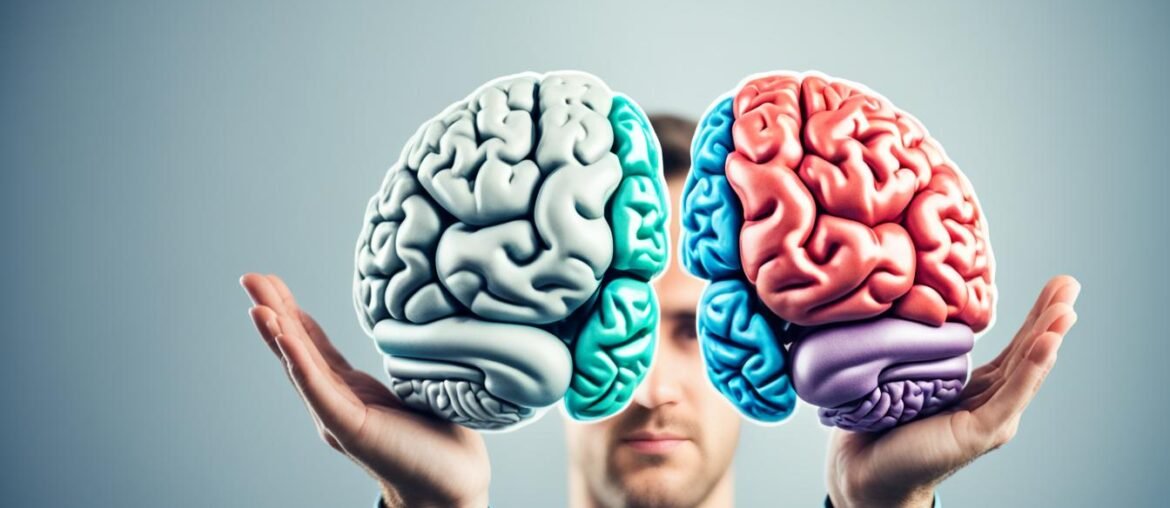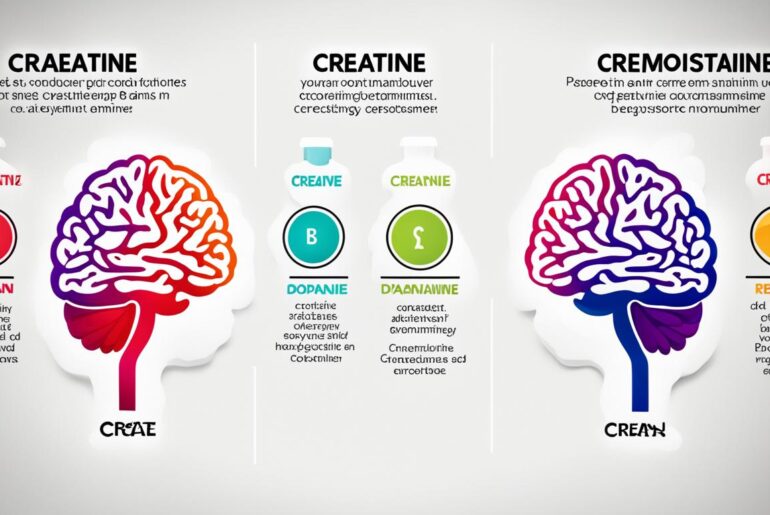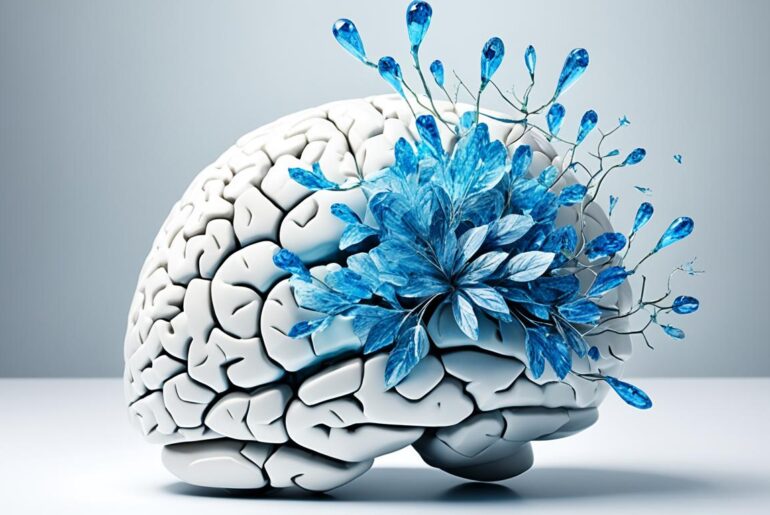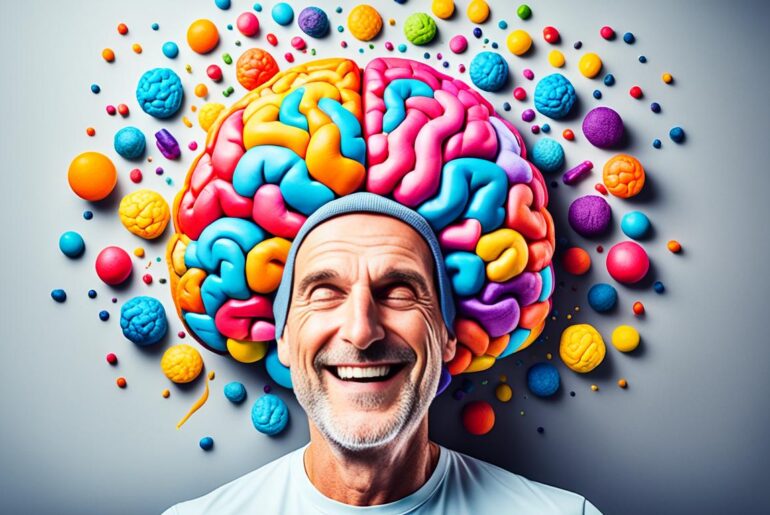Amid a sea of supplements claiming to boost physical prowess, there’s one that has made a distinct cross into the territory of mental might. Surprisingly, it’s not a nootropic engineered in a lab but a well-known athletic aid — creatine. Beyond its muscular merits, I’m drawn to an intriguing hypothesis: can creatine bolster our mental acumen? In the spheres of cognitive effects of creatine, this notion is not mere conjecture. My exploration into this realm is spurred by findings that 5-10% of the body’s creatine is actually situated in the brain, a caveat that makes creatine supplementation and brain power a compelling subject for discourse.
Dubbed as a potential cognitive enhancer, creatine’s role in enhancing brain performance overshadows its humble beginnings as a strength supplement. I delve into the research, peeling back layers of scientific rigor, to uncover if creatine and cognitive enhancement are a match made in cerebral heaven or merely wishful thinking. Let’s unravel the evidence together.
Key Takeaways
- Creatine’s significant presence in the brain piques curiosity about its relationship with cognitive functions.
- Understanding how creatine supplementation may offer more than just muscle-building benefits is crucial.
- A focus on the cognitive effects of creatine may illuminate new strategies for brain health and intelligence.
- Research tackles whether there is a concrete link between creatine use and enhanced cognitive abilities.
- My analysis aims to cut through the noise and provide insights on the effectiveness of creatine in boosting mental performance.
- The potential neuroprotective properties of creatine could redefine its role from a gym staple to a brain-boosting ally.
Introduction to Creatine’s Role in the Brain
As a naturally occurring compound, creatine plays a pivotal role in the metabolic processes of our body, including those within the brain. My exploration into this fascinating substance reveals its profound influence on our cognitive functions and pinpoints the benefits of creatine for brain function. Intriguingly, the capacity of creatine to bolster our mental faculties stems from its fundamental duty as an energy provider, particularly in high-demand situations.
Now, let’s delve deeper into understanding how creatine affects brain function and its historical applications:
Understanding Creatine as a Brain Compound
The synthesis of creatine occurs endogenously from vital amino acids, laying the groundwork for the compound’s ability to transform into phosphocreatine. This form is vital for maintaining energy balance, especially in the brain, where rapid and efficient energy delivery is crucial for cognitive functions like processing speed and overall brain acuity. Another interesting fact is that the brain is not merely a passive recipient of creatine; it can also synthesize creatine on its own. This dual capacity for both importing and endogenous production underlines the substance’s critical role as a brain-enhancing agent.
Historical Context of Creatine for Cognitive Enhancement
While creatine’s reputation has been built on its prowess in enhancing athletic performance, its impact on cognitive enhancement is a frontier of growing interest among scientists and health enthusiasts alike. With an established link between creatine levels and mental performance, I’ve noted an uptick in the attention towards the potential for enhancing brain performance with creatine. Endogenous creatine supplementation’s demonstrated ability to increase the brain’s own energy reserves solidifies the connection between optimal creatine levels and improved cognitive operations. The presence of genetic disorders that affect creatine synthesis and lead to cognitive impairment further validates the significance of creatine in maintaining cognitive health.
| Cognitive Process | Impact of Creatine |
|---|---|
| Energy Homeostasis | Supports rapid energy supply for cognitive tasks |
| Phosphocreatine Reserves | Enhances brain’s energy storage for demanding activities |
| Cognitive Performance | Linked with higher creatine levels, promoting mental acuity |
| Genetic Disorders | Creatine supplementations can mitigate cognitive symptoms |
My mission is to continue unraveling the utility of creatine beyond muscle-building, as its profound implications for cognitive health could be key in revolutionizing how we think about brain optimization and the ongoing quest to enhance mental performance.
How Does Creatine Affect Brain Function?
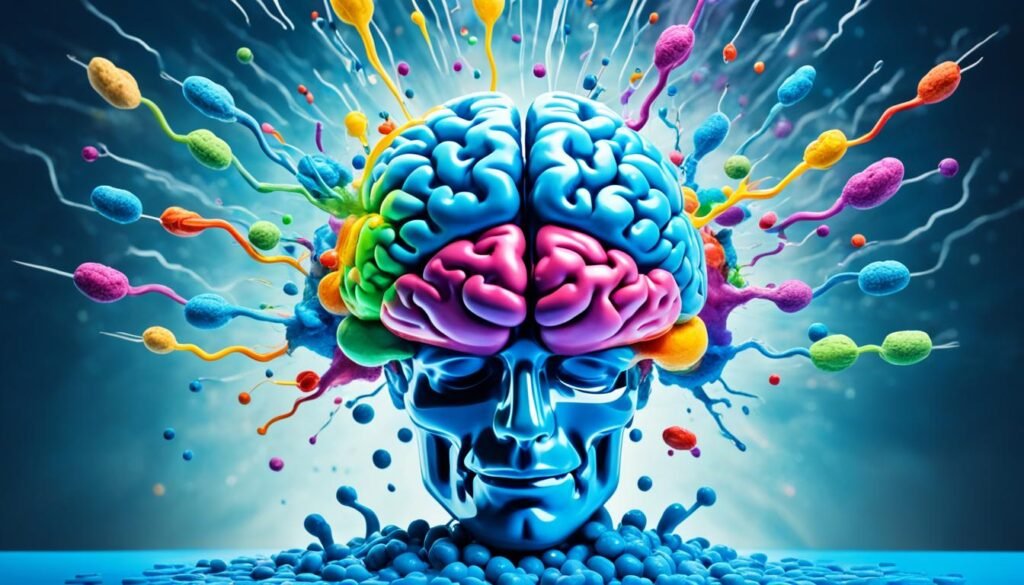
When considering the neuroprotective effects of creatine, I like to think of it as a guardian of cognitive vitality. Just as a shield would protect a warrior in battle, creatine defends our neurons during periods of high stress and energy demand. It enriches our brain’s arsenal against exhaustion and wear, due in part to its role in maintaining ATP levels. This, in turn, energizes our cognitive processes, perhaps unlocking enhanced brain performance.
What’s more, creatine’s potential extends into the realm of brain-boosting effects. By supporting neuronal plasticity, it lays the groundwork for our brains to adapt and grow in response to mental training. Studies have correlated higher resting levels of brain creatine with better performance on cognitive tasks. This fascinating interplay between creatine and mental function suggests that by boosting our brain’s creatine reservoir, we might elevate our cognitive capabilities.
In my quest to better understand how increasing brain creatine can enhance cognition, I constructed a table to illustrate the contrast between normal and elevated creatine levels on cognitive task performance.
| Cognitive Task | Performance with Normal Creatine Levels | Performance with Elevated Creatine Levels |
|---|---|---|
| Short-term Memory | Baseline Performance | Improved Retention and Recall |
| Intelligence Reasoning | Stable Problem-Solving Ability | Enhanced Analytical Thinking |
| Mental Stamina | Typical Endurance in Prolonged Tasks | Increase in Sustained Concentration |
| Spatial Navigation | Adequate Navigation Skills | Increased Accuracy and Efficiency |
As the table suggests, elevated creatine levels in the brain seem to positively influence cognitive performance across a spectrum of tasks. This supports the idea that creatine isn’t just for bodybuilders – it’s a compound with serious potential for those looking to boost their mental might.
Assessing the Cognitive Benefits of Creatine
As a well-regarded supplement in the athletic arena, creatine’s potential to enhance cognitive abilities is a compelling segment of current neuroscience research. The discussion centers on whether does creatine improve mental performance and if creatine supplementation affects brain power.
Short-Term Memory and Intelligence Reasoning
In examining the cognitive impact of creatine, researchers have focused on specific areas such as short-term memory and intelligence reasoning. Clinical trials suggest that these particular cognitive facets receive measurable benefits from creatine intake. Vegetarian individuals, interestingly, exhibit a more pronounced improvement in memory tasks compared to their meat-eating counterparts, pointing to dietary habits as a variable in creatine’s efficacy.
Research Insights on Creatine’s Cognitive Effects
An analysis of randomized clinical trials provides a structured insight into how creatine supplementation and brain power are interlinked. While the younger demographic shows a negligible response, the data inclines towards more significant cognitive enhancements among older adults and those encountering stress, suggesting that creatine’s benefits may become more salient against a background of age-related decline or heightened cognitive demands.
| Cognitive Domain | Effect in Young Adults | Effect in Older Adults | Effect in Vegetarians |
|---|---|---|---|
| Short-Term Memory | Minimal | Noticeable Improvement | Enhanced Memory Tasks Performance |
| Intelligence Reasoning | Variable Response | Suggestive of Benefit | Data Not Specified |
| Other Cognitive Tasks | Non-Uniform Response | Potential for Enhancement | Better Response than Meat-Eaters |
Thus, intricacies such as baseline diet and age inherently influence the degree to which creatine can bolster cognitive function. Still, the general consensus points toward a positive correlation between creatine intake and mental acuity enhancements. Further research would solidify these findings and help tailor creatine usage recommendations for optimizing mental performance.
Creatine Supplementation: The Neuroscience Perspective
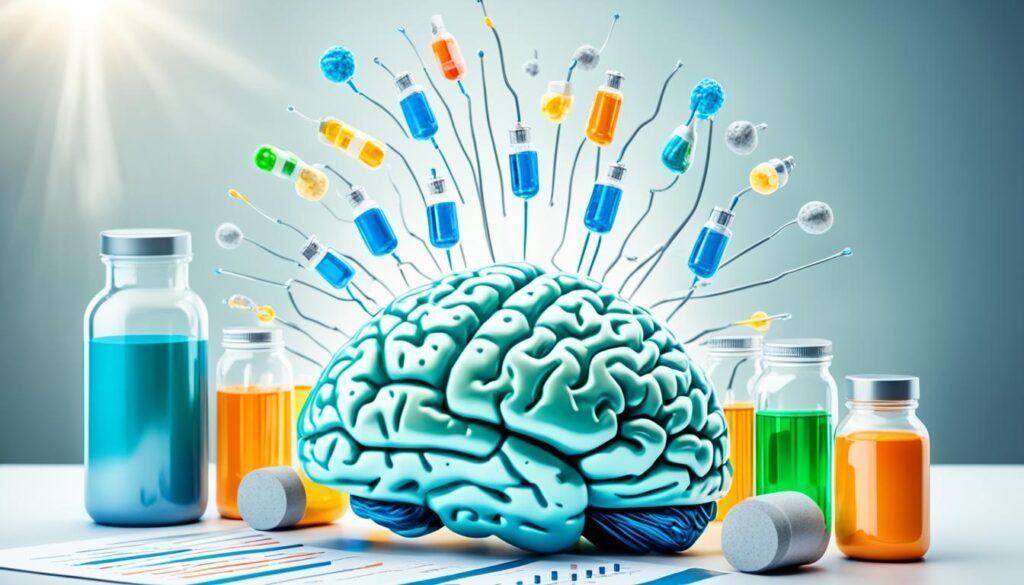
As a journalist passionate about the intricacies of neuroscience, I’ve found that creatine, a substance well-known for enhancing physical stamina, also appears to play a significant role in cognitive enhancement. The cognitive effects of creatine have recently emerged as a fascinating topic within the scientific community, leading to a surge in research on its potential benefits to brain health.
Evaluating Energy Supply to Neurons
One of the pivotal functions of creatine within the brain involves the energy supply to neurons. Neurons are highly active cells, their survival and function depending on a consistent and ample supply of energy. During periods of high cognitive demand, neurons deplete their energy reserves rapidly. Creatine supplementation is thought to bolster the available energy in these critical moments, offering a buffer that can lead to enhanced cognitive performance.
From what we’ve seen in studies, the healthy adult brain can utilize the elevated reservoir of phosphocreatine, which creatine supplementation provides, to quickly replenish ATP – the cellular currency of energy. This action is fundamental during energy-consuming processes like complex problem-solving or intense focus, both of which can theoretically benefit from the cognitive effects of creatine.
The Role of Creatine in Neuronal Plasticity
Equally important is creatine’s role in neuronal plasticity, the brain’s ability to change and adapt as a result of experience. Creatine’s contribution to this adaptability could be key to cognitive enhancement. When we engage in mental training or challenging cognitive activities, it appears that our brain’s creatine levels can increase, a change that correlates with improved performance in cognitive tasks. This is especially pronounced in tasks that deal with recognition memory, a fundamental aspect of learning and memory.
Furthermore, the clinical relevance of creatine is accentuated by studies on genetic creatine deficiencies, which often lead to cognitive impairment. Yet, the introduction of creatine supplements has been known to help reverse such deficiencies, which suggests its substantial role in maintaining and enhancing brain health. The impact that creatine supplementation can have across various cognitive domains, therefore, is not only promising but also compelling within the broad expanse of neuroscience research.
Does Creatine Enhance Brain Performance? Empirical Evidence Debates
The discourse surrounding the efficacy of creatine and cognitive enhancement is characterized by contrasting perspectives from various research studies. As someone who regularly investigates the impacts of supplements on brain function, I have encountered numerous accounts arguing for and against the notion that does creatine improve mental performance. This inconsistency arises from the nature of scientific inquiry, where research methodologies, subject populations, and dosage protocols greatly influence outcomes.
Drawing from the extensive pool of empirical studies, the benefits of creatine on cognitive enhancement are neither universally acknowledged nor uniformly dismissed. Below is a compilation of research findings outlining the divergences in the data on creatine’s potential as a cognitive enhancer:
| Study Focus | Positive Findings | Negative or Neutral Findings |
|---|---|---|
| Short-Term Memory | Improved performance in memory tasks, particularly in vegetarians | No significant advantage for individuals with adequate dietary creatine |
| Intelligence Reasoning | Enhanced reasoning skills in populations with lower baseline levels of creatine | Marginal or no cognitive improvement in young, healthy adults |
| Aging Individuals | Potential mitigation of age-related cognitive decline | Inconclusive results, with need for more extensive long-term studies |
| Stressed Populations | Significant improvements under physically or mentally stressful conditions | Mixed results, suggesting further investigation into stress variables |
As illustrated in the table, the debate over creatine’s benefits to brain performance is far from settled. Cognizant of the myriad factors impacting the interpretation of data, it is paramount that one approaches the available evidence with a tempered perspective. The continued exploration into the cognitive implications of creatine supplementation is critical, necessitating rigorously designed studies that can illuminate the complexities of this narrative.
In summary, while the notion that creatine can act as a cognitive enhancer holds weight in certain contexts, the diverse array of research findings underscores a need for caution before drawing general conclusions. These scientific deliberations are ongoing and hold promise for delineating the conditions under which creatine supplementation could be most beneficial for brain health.
Mechanisms Underlying Creatine’s Brain-Boosting Effects
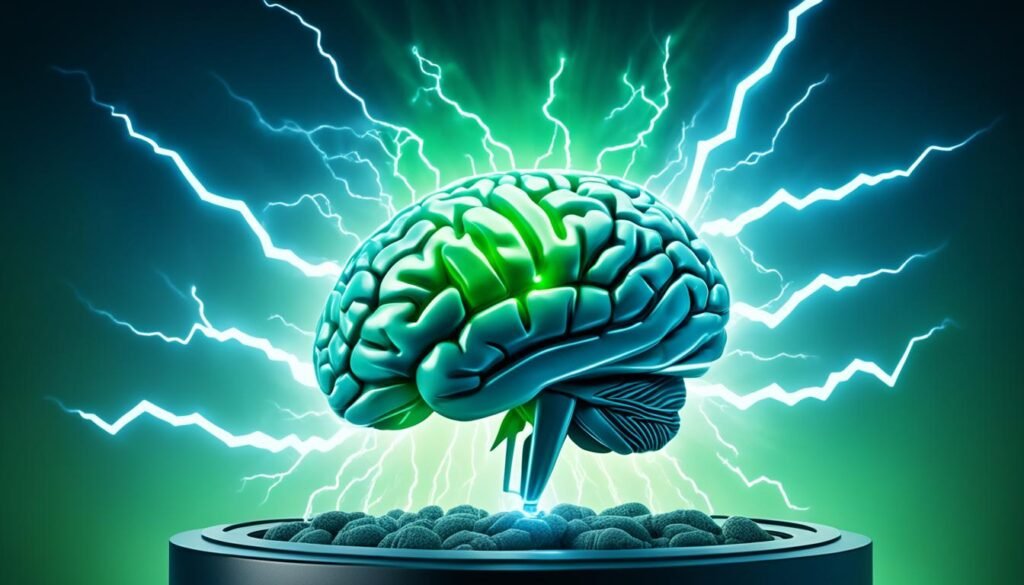
In exploring the benefits of creatine for brain function, it becomes clear that the substance is more than just a muscle-enhancing supplement. It plays a pivotal role in neurology, thanks to its energy buffering and neuroprotective effects. Understanding how creatine assists brain metabolism not only enlightens us about our neurological health but may also pave the way for new cognitive enhancement strategies.
Energy Buffering and Phosphocreatine Dynamics
One core mechanism by which creatine impacts the brain is through its role in energy homeostasis. Phosphocreatine acts as a high-energy reserve that quickly replenishes ATP levels, which can be depleted during intense cognitive tasks. This function is essential whenever the brain requires sudden surges of mental energy, suggesting creatine’s supportive role in processes like learning, problem-solving, and concentration enhancement.
Genetic Disorders and Creatine’s Neuroprotective Effects
Genetic conditions that affect creatine synthesis or transport, such as AGAT, GAMT, or SLC6A8 deficiency, commonly manifest with neurological concerns like cognitive dysfunction. Creatine’s ability to ameliorate cognitive deficits in such scenarios illuminates its therapeutic potential, augmenting its status as more than just an ergogenic aid.
| Condition | Symptoms | Role of Creatine Supplementation |
|---|---|---|
| AGAT Deficiency | Developmental delay, speech deficit | Restores creatine synthesis, improves symptoms |
| GAMT Deficiency | Movement disorders, cognitive impairment | Boosts creatine levels, provides neuroprotection |
| SLC6A8 Deficiency | Autism-like symptoms, epilepsy | Enhances creatine transport, reduces symptoms |
By understanding these internal processes, I remain convinced of the crucial role creatine plays – beyond the gym – in bolstering our cognitive resilience.
Evaluating the Safety and Efficacy of Creatine Supplementation
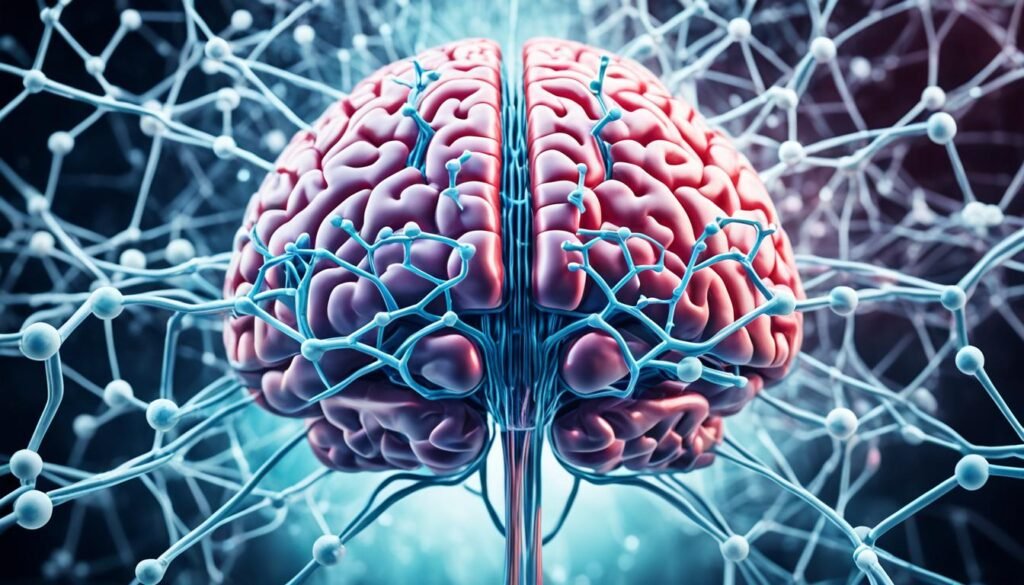
When it comes to understanding how creatine affects brain function, there is a clear need to address the concerns surrounding its safety and efficacy. My pursuit of in-depth research reflects an unwavering commitment to uncovering the facts beneath publicized studies, thus equipping readers with evidence-based insights. Let’s delve into the recent scientific findings:
Scrutinizing the safety of creatine brings to light its well-tolerated nature, evidenced by minimal reports of side effects. The most commonly identified repercussion, slight weight gain, is typically attributed to increased water retention rather than any severe biochemical imbalances or health deteriorations. That being said, consistency in consumption and dosage plays a pivotal role in the maintenance of this safety profile.
As for the efficacy aspect, the scenario is more variegated. A wealth of studies highlights improvement in cognitive tasks following creatine supplementation, pointing towards a positive impact on brain function. However, this is juxtaposed with research that either refutes these claims or demands further investigation. In my analysis, a recurrent theme calls for expanded study cohorts, rendering current findings as stepping stones to more conclusive evidence.
As someone deeply entrenched in the investigative realm of supplements and their role in cognitive performance, I present a comparative table encapsulating the existing research on creatine’s impact:
| Study | Sample Size | Outcome | Comments |
|---|---|---|---|
| Study A | 40 adults | Improved memory tasks | Subjects were vegetarians |
| Study B | 60 elderly subjects | Mild improvement | Supplementation for 6 months |
| Study C | 30 athletes | No cognitive change | Focused primarily on physical performance |
| Study D | 50 young adults | Varied responses | Indicated possible metabolic factors at play |
My independent interpretation recommends cautious optimism, where creatine stands a noteworthy candidate for enhancing brain function, provided that upcoming larger-scale studies fortify the current groundwork of knowledge. I am, therefore, diligent in monitoring the forthcoming research with a discerning eye, ever-ready to update our audience with the most accurate and helpful information on the fascinating interplay between creatine supplementation and cognitive health.
Creatine and Cognitive Enhancement in Aging Populations

As we delve into the golden years of life, the quest for maintaining a sharp and agile brain becomes paramount. Creatine supplementation stands at the forefront of research, with a beacon of hope to potentially uplift brain power and forestall the cognitive decline associated with aging. Embracing the principle of enhancing brain performance with creatine, we investigate how this supplement could play a pivotal role in the lives of our elders.
Potential for Mitigating Age-Related Cognitive Decline
My exploration into the world of neurotransmission and brain energy metabolism unveils creatine as more than just a muscle-building aide; it emerges as a guardian of the aging brain. Preliminary evidence ignites curiosity around creatine supplementation’s potential to fortify cognitive resilience against the relentless tide of aging, especially in enhancing memory and executive functions that often wane over time. However, a call to action for more rigorous research rings loud, signaling the need to crystallize these promising findings into concrete recommendations.
The Impact of Creatine on Memory and Executive Functions in the Elderly
Memory and executive function—the cornerstones of a sharp mind—often suffer the brunt of the aging process, leaving many seniors searching for strategies to preserve cognitive clarity. My investigation reveals that creatine, with its commendable safety profile, holds promise. Its pivotal role in energy metabolism could energize neurons, potentially reversing the age-induced energy deficit and providing a buffer against cognitive decline. The quest for conclusive reality continues as we seek to affirm whether creatine supplementation can indeed transform into a beacon of hope for brain power in our aging population.
The canvas of aging is complex, with each stroke of decline presenting an opportunity for intervention. In my pursuit of understanding creatine’s place in cognitive enhancement, it becomes clear that while the threads of evidence weave a tapestry of potential, only through more extensive, well-designed studies can the true picture of creatine’s efficacy be revealed.
Creatine Usage: From Athletes to Cognitive Health

Historically, the surge in creatine use has been tightly bound to the world of sports, where its prowess for enhancing physical strength and performance is well-documented. However, in my observations, the tide appears to be turning with increasing evidence linking creatine to cognitive health benefits, turning this supplement into a brainpower enhancer. Specifically, research dives into whether does creatine improve mental performance and the brain-boosting effects of creatine — questions of significant interest for those beyond the athletic sphere.
Comparing Athlete Supplementation with Cognitive Health Applications
The comparison between the supplementation of creatine in athletes and its applications for cognitive health reveals a fascinating overlap. Both domains leverage creatine’s ability to increase energy production and reduce physiological stress. The direct impact on muscle energy stores translates seamlessly into the cognitive realm, where energy demands are equally unyielding.
Expanding Creatine’s Benefits Beyond Athletic Performance
The scope of creatine’s utility is expanding, with research hinting at its applicability far beyond athletic enhancement. A broader role in neurological conditions, such as depression and trauma recovery, points to a promising avenue for the supplement’s use in cognitive therapy. The notion that creatine supplementation might harbor untapped potential for supporting mental performance and handling cognitive conditions is a thrilling possibility for the future of health and wellness.
Curious about the direct comparisons between athletes’ intake of creatine and those using it for mental sharpness, my investigation led me to construct the following table:
| Parameter | Athletes | Cognitive Health |
|---|---|---|
| Primary Use | Muscle Energy & Recovery | Mental Energy & Cognition |
| Expected Outcome | Improved Physical Performance | Enhanced Memory & Focus |
| Method of Action | ATP Resynthesis during Exercise | ATP Resynthesis during Cognitive Activity |
| Benefits | Increased Muscle Mass, Strength | Potential Improvement in Neurological Conditions |
| Population | Athletes, Bodybuilders | Elderly, Students, Individuals with Mental Fatigue |
The parallels drawn from this comparison provide a clearer understanding of how creatine’s benefits may transcend traditional usage, giving hope for its role in enhancing mental faculties.
In summarizing my findings, while the conversation around creatine has long orbited the realm of endurance and strength in athletes, the narrative is evolving. Its potential impact on cognitive faculties presents an intriguing chapter in the science of supplementation, one which I am keen to follow as further research unfolds.
Conclusion
As we reach the end of our inquiry into the cognitive effects of creatine, it’s clear that the answer to “Does Creatine Enhance Brain Performance?” isn’t black and white. My exploration has revealed a nuanced interaction between neuroscience, genetics, and individual lifestyles that defines how creatine contributes to mental acuity. The evidence available suggests that creatine may indeed offer a modest advantage in areas like short-term memory and intelligence reasoning, though individual outcomes will vary.
The consensus in the scientific community converges on the point that comprehensive research is still needed. To thoroughly unpack creatine’s potential role in cognitive enhancement, larger and more diverse studies are paramount. Given creatine’s established safety and ease of accessibility, the pursuit of a definitive answer is both a feasible and worthwhile endeavor. Should further investigations confirm even a slight cognitive benefit of creatine supplementation, the ripple effect on societal cognitive health could be significant.
Ultimately, in the dynamic landscape of cognitive health research, my ongoing quest for knowledge is as robust as ever. With current findings in hand, I encourage continued scholarly dialogue and investigation into the intriguing proposition that this well-known sports supplement could, in fact, be a key player in enhancing brain performance across the lifespan.
FAQ
Does Creatine Enhance Brain Performance?
Emerging research indicates that creatine may have a modest positive effect on certain aspects of brain performance, particularly in short-term memory and intelligence reasoning. However, the enhancement effects are variable, suggesting a need for further research to establish definitive conclusions.
What roles does creatine play in the brain?
Creatine acts as an energy buffer by storing and releasing high-energy phosphates to aid in ATP replenishment, particularly during energy-demanding activities in the brain. It also plays a role in neuronal plasticity, which is essential for learning and cognitive function.
How does creatine affect cognitive functions?
Supplemental creatine has been shown to support certain cognitive functions, including short-term memory and intelligence reasoning, especially in individuals who may have lower levels of creatine due to dietary habits, such as vegetarians.
Is there evidence to suggest that creatine has neuroprotective effects?
Yes, creatine has demonstrated neuroprotective effects, particularly in the context of genetic disorders where creatine synthesis or transport is impaired. Supplementation can mitigate cognitive impairments associated with these conditions, which supports the idea of creatine as a neuroprotective agent.
Are there research insights on creatine’s cognitive effects?
Research has shown variable outcomes on creatine’s cognitive effects. Some studies highlight improvements in cognitive tasks after supplementation, while others report minimal or no significant changes. The variance indicates that creatine’s cognitive benefits may differ among individuals.
What is the role of creatine in neuronal plasticity?
Creatine supports neuronal plasticity, a foundational aspect of learning and memory formation. It may help maintain the energy supply necessary for the structural changes that occur in neurons during the learning process.
What are the empirical debates surrounding creatine’s enhancement of brain performance?
The debates focus on the inconsistent findings of research studies. Some data provide support for cognitive benefits, while other studies are inconclusive or show marginal effects, highlighting the complexity of determining creatine’s role in cognitive enhancement.
How does energy buffering contribute to creatine’s brain-boosting effects?
Energy buffering through the creatine-phosphocreatine system allows for immediate ATP regeneration in brain cells, which is critical during intense periods of mental activity. This rapid replenishment of energy may aid in supporting cognitive tasks that require quick access to mental energy.
Can creatine supplementation be considered safe and effective?
Creatine is generally considered safe, with few reported side effects such as water retention, which may lead to weight gain. However, its efficacy as a cognitive enhancer needs to be further established through more comprehensive research studies.
Some studies suggest that creatine supplementation may improve cognitive functions, like memory, in older adults, potentially serving as a tool to mitigate age-related cognitive decline. However, the evidence is mixed, and more extensive research is needed.
How does the usage of creatine differ between athletes and those interested in cognitive health?
While athletes typically use creatine to enhance muscle mass and performance, individuals interested in cognitive health may use it with the aim of improving cognitive tasks and protecting neuronal health. The same underlying mechanisms of energy supply and physiological stress mitigation apply to both uses.
Can creatine’s benefits extend beyond athletic performance to treat neurological conditions?
There is potential for creatine to have therapeutic effects in neurological conditions such as depression, anxiety, and traumatic brain injury. Exploring these applications could expand creatine’s scope to further include cognitive health.

